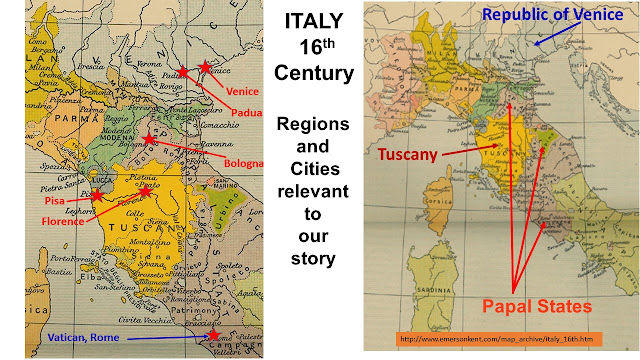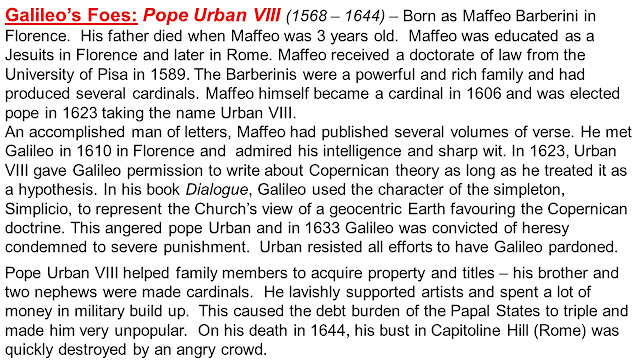Index of Blogs
Galileo Galilei lived in Italy four hundred years ago. He made some astonishing scientific discoveries which would be sufficient to rank him among the very best. His impact on the scientific method - how a theory or hypothesis becomes established - was far-reaching. Galileo emphasized the role of experimental verification of what a theory predicts as paramount for its acceptance. Stephen Hawking calls Galileo the father of modern science.
Italy of the 16th and 17th century was a turbulent place with the Catholic Church fighting for its pre-eminent position against the onslaught of the forces of Reformation. Having launched the Counter-Reformation, the Church was keen to suppress any dissenting voices and Galileo, with his research in astronomy, was sucked into this intrigue. He paid a heavy price for demonstrating faith in his work and standing up for what he believed to be the real truth.
I start by presenting the family tree of Galileo Galilei. I also present a very brief political background of sixteenth century Italy and point out the relevant regions and cities.
(Click on the slide to view its full size image; press Escape key to return to the main text)
The history of Italy in
the 16th century is characterized
by foreign domination. Following the Italian Renaissance
Wars (1494–1559), the south of Italy and the Duchy of Milan were
controlled by Catholic Habsburg Spain.
The Republic of Venice, the Duchy of Florence, the Papal
States and the Republic of Genoa remained independent. The House of Medici was recognized as the ruling family of the Grand Duchy of
Tuscany by Pope Pius V.
The Papal States launched
the Counter-Reformation, which lasted from the Council of
Trent (1545-1563) to the Peace of Westphalia in 1648 to end the
Thirty Years’ War fought in Central Europe resulting in eight million fatalities.
Initially a war between various Protestant and Catholic states in the
fragmented Holy Roman Empire, it gradually developed into a more general
conflict involving most of the great powers. The war became less about
religion and more of a continuation of the France–Habsburg rivalry for
European political pre-eminence.
The Inquisition was
a group of institutions within the government system of the Catholic
Church whose aim was to combat heresy. With the Protestant
Reformation, Catholic authorities in the Vatican became much more ready to suspect
heresy in any new ideas. In 1542 Pope Paul III established the
Congregation of the Holy Office of the Inquisition.
It had the tasks of maintaining and defending the integrity of the faith and of
examining and condemning/outlawing errors and false doctrines; it thus became the
supervisory body of local Inquisitions. Arguably, the most famous case
tried by the Roman Inquisition was that of Galileo Galilei in 1633. There are some detailed accounts online (1, 2) and good books (3) describing Galileo's scientific work. I give a brief introduction in the following two slides.
Most scientists work very hard on the subject they love but by and large they operate in a benign environment. May be not well paid but they are able to have a lifestyle that suits them best to pursue their research without interference from politics and other social/religious matters.
Galileo did not have such luxury - he was short of money during the first half of his life with a big family to support. His work was in direct conflict with the powerful Catholic Church and was hounded for 30 years by the religious mafia. It is to Galileo's credit that in such an environment he was able to produce scientific work of such great merit and change the way science was to be practised in future years.






















No comments:
Post a Comment